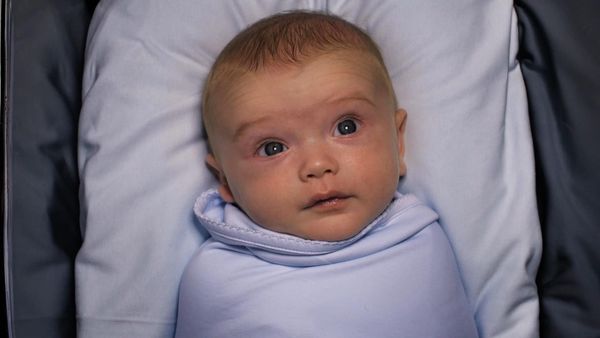Eye For Film >> Movies >> American Circumcision (2017) Film Review
American Circumcision
Reviewed by: Jennie Kermode

Across most of the world, with the exception of those places where it's a majority religious practice, the circumcision is rare. In the United States of America, it's carried out on 77% of newborn males. There's a deep cultural belief that it's healthier, cleaner, normal, and has no negative effects. But can these arguments be substantiated? An increasing number of men who object to what was done to their bodies think otherwise.
There is no suggestion here that male circumcision is damaging in the same way as female genital mutilation, which is discussed at length (the 'normalisation' of intersex genitals is curiously omitted) but that doesn't mean it's a trivial issue - indeed, one woman interviewed here describes the trauma she went through and cites it as a reason why she wants boys to be protected too. Providing this context emphasises the cultural nature of the phenomenon, one of the few things that really unites America's very different social groups. Though its defenders often accuse opponents of being anti-Semitic, it extends far beyond the Jewish community - and, indeed, there are Jews amongst those campaigning for it to stop.

Perhaps the biggest thing the internet has done to change society is to let isolated individuals struggling with difficult issues know that they're not alone. The Intactivist movement has grown up over the past two decades to the point where it is now able to organise protests at medical conferences and bring its concerns to the attention of the public. It includes medical professionals, some of whom are interviewed here. We also hear from two prominent supporters of the procedure and even from a woman who supports female circumcision (though only where it's performed on consenting adults, which makes this an interesting aside but really a very different issue).
Consent is at the heart of the issue. The argument for intervening in infancy is founded on two beliefs: that it doesn't cause pain, and that nobody can remember it. The notion that newborn babies can't really feel pain is bizarre in light of evidence from other areas of neonatal care, and nurses and parents speak here at length about the tortured cries they have heard during circumcisions. We also see a video of the procedure being carried out which - even though anaesthetic has been used - many viewers will find extremely distressing. As far as memory is concerned, we are presented with men who have nightmares which they believe are related to it, and others are being treated for symptoms of post traumatic stress.
There's an elephant in the room which the film eventually addresses. If circumcision helps preserve health, how come the diseases it's supposed to protect against are no less common - or are even more common - in the US than in comparable European countries? A handy lesson in how to read statistics should help even those viewers who lack confidence with numbers to make sense of the data for themselves. The film doesn't pretend to be objective but it substantiates its medical arguments well.
Babies die from complications of circumcision. They can also have their genitals destroyed - there's an interview here with a mother who has only just found out that this is what happened to her son. So why does it persist? Interesting theories are offered. There isn't room to go into them in detail, which is a shame, but the film covers a great deal of ground as it is.
A must for parents-to-be considering this issue - if only because, whatever they choose, it can help to give them confidence that they have made an informed decision - Brendon Marotta's film presents a wide-ranging analysis of a neglected subject.
Reviewed on: 28 Aug 2018














